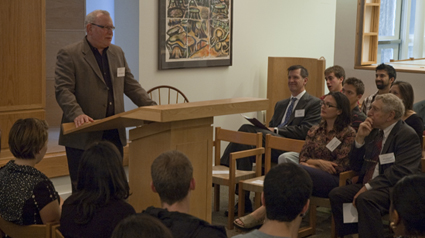In many religions, food is love. Now, thanks to generous contributions from Mike Saperstein ’62 and Charles Axelrod ’63, ˛Řľ«¸ó’s Michael Saperstein Jewish Center has two brand new hearts: two spacious kitchens where meat and dairy foods can be prepared separately, so traditional kosher meals can be shared.
 |
| Chuck Axelrod ’63 addresses the ˛Řľ«¸ó community during the September 22 rededication of the Michael Saperstein Jewish Center. (Photo by Janna Minehart ’13) |
In addition to the new kitchens, the recent renovation also included new carpeting, improved storage, and the installation of a plasma TV and a SMART board.
“The Saperstein was always intended to be a facility open to believers of all faiths,” said Saperstein, whose 1993 investment has blossomed into one of the campus’ most welcoming spaces.
The latest gifts give significant momentum to a larger Passion for the Climb initiative launched last November to raise $5.3 million to support Jewish life and Jewish studies at ˛Řľ«¸ó. At that time, both Saperstein and Axelrod stepped forward with leadership gifts toward the renovation. Both also documented bequests to ˛Řľ«¸ó, with Axelrod dedicating his in the name of his wife, Tracy.
The September 22 rededication event was symbolically scheduled for one of the sacred days between the Jewish High Holidays. In practical ways, too, the timing was perfect.
Interim President Lyle Roelofs observed: “This is traditionally a time of anxiety for the Jewish community as individuals wait in hope of being sealed for a good year. If our gathering today is any indication, it is going to be a wonderful year.”
One hundred kosher dinners were prepared for Rosh Hashanah in the new Axelrod kitchens. Afterward, students and members of the ˛Řľ«¸ó community ushered in the New Year in their newly improved surroundings.
Four days later, at the formal dedication, ˛Řľ«¸ó’s Rabbi David Levy quoted from the Old Testament’s Book of Exodus, in which God says, “Construct for me a sanctuary that I may dwell among them.”
“I think the verse teaches us that, by creating beautiful spaces, we create places for the community to gather and to experience God collectively,” said Levy. “The new and improved Michael Saperstein Jewish Center is just such a space. We only need to look at one week here to see this at work.”
Levy then described a host of recent academic, religious, and social activities held in the space, including a morning Hebrew study session, a Jewish literature class, a meeting of members of the ˛Řľ«¸ó Jewish Union, an informal lunch discussion called Big Questions Jews Ask, and an afternoon mourner’s kaddish prayer session to support a faculty member whose mother had passed away.
Alice Nakhimovsky, professor of Russian and Jewish studies, agreed that the space has taken on special significance over the years. “We are used to thinking about material things as attractive but superficial,” she said. “But sometimes material things can be spiritual things, too.”
Sharing family stories with guests at the dedication, Saperstein and Axelrod imbued the center’s new kitchens, social spaces, and educational areas with memories. “As we moved through the building,” said Nakhimovsky, “we were aware of the connection, through them, to a part of American Jewish history.”